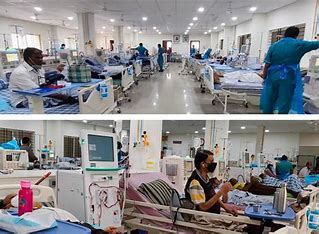
A study conducted by Centre for Cellular and Molecular Biology (CCMB) and the Indian Institute of Chemical Technology (IICT) on sewage samples collected from Hyderabad, has found out that around 6.6 lakh people were shedding viral faecal material in the city.
The joint study has revealed that an infected person not only sheds virus through nasal and oral routes but also through faeces. A patient sheds viral material in faecal samples for up to 35 days. This study which covered about 80% of the sewage treatment plant (STPs) in Hyderabad revealed that there were around 2 lakh people who were shedding viral materials. Since only 40% of the Hyderabad sewage reaches STPs, this data can be used to extrapolate the overall number of potentially infected people, which turned out to be approximately 6.6 lakh, that is around 6.6% of the city’s population, which includes symptomatic, asymptomatic, and also recently recovered individuals.
The SARS-CoV-2 in sewage samples is noninfectious, thus it made sewage samples suitable for epidemiological studies. Samples from STPs were processed for detecting the presence of SARS-CoV-2 viral RNA. While viral RNA is detectable in the inlet samples, the outlet (after treatment) samples of STP were largely clean (free from viral RNA) in this regard, indicating efficient treatment practices at STP.
CCMB Director Dr Rakesh Sharma said, “Our finding clearly indicates that a large proportion of the affected individuals are asymptomatic and did not need hospitalisation. This is also in agreement with the observation that hospitalization rush or mortality is way lower than otherwise expected with such a large infection rate at a given time. It explains why our healthcare system has been able handle reasonably well the situation during the pandemic. Such studies if carried out in coordination with civic bodies to identify the hot spots in the city and monitor the dynamics of the infection rate can assist the system in taking necessary measures.”















